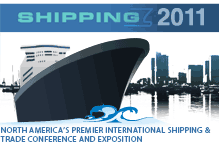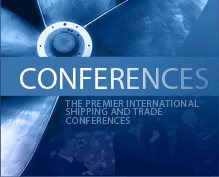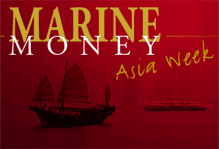
On the Other Hand
What does John Fredriksen know? On the Thursday following Navios’ announcement, Golden Ocean Group Limited revealed its sale of approximately 3.9 million shares of Navios Maritime at an average price of $4.50 per share. It appears that these sales preceded Navios’ announcement of the new acquisitions, and reflects opportunistic sales in the recent run of shipping stocks, generally as a means of raising cash. As a result of these sales, Golden Ocean realized a net loss of $11.6 million. Given that the position had already been dramatically marked down based on March market values, the ironic net effect of the sale is an $8.5 million increase to equity. The sale also increases the company’s cash position by $17.4 million. The company still holds ~1.4 million shares. We believe this liquidation is a liquidity raising exercise as opposed to a vote on the Navios’ prospects.
Award Affirmed
As we prepared to make the formal presentation of Dealmaker of the Year to Angeliki Frangou and her Navios team at Marine Money Week, we learned that she concluded yet another innovative deal and one that is certainly representative of the times in which we find ourselves. In a sense, she married an opportunity to the solution of the larger financial issue facing our industry.
Last Monday, Navios announced the acquisition of four newbuilding Capesize vessels currently under construction at a South Korean shipyard. Three of the vessels were purchased from companies controlled by Commerzbank AG. The seller of the 4th was not disclosed.
Done Deal?
We have heard rumors recently that US Shipping Partners LP has reached agreement with Blackstone and Cerebrus with respect to the joint venture USS Products Investor LLC. We understand that in exchange for a cash payment Blackstone and Cerebrus have assumed control of the entity and have replaced USS LP as the manager. Details are meager.
FFA & BDI
UNCTAD made some widely noticed remarks (Transport Newsletter No.42) about how BDI may now longer be such a good indicator for changes on the demand side for commodities. It is no longer the mirror it once was for industrial production. One reason for this disconnection is that there are big waves of tonnage supply coming into supply-demand equation compared to years past. The BDI also is no long the same BDI has years past, suggested the UNCTAD writer, due to the rise of FFA market which counts players who are not providers or users of shipping as participants. The BDI is no longer about the currrent demand-and-supply balance but also about future expectations of this balance.
We have watched with interest as the shipping establishment comes to grips with what some quarters see as a hi-jacking by the financial types. While we are avid readers of the UNCTAD Transport Newsletter, the debate, surfaced after this was reported by Lloyd’s list (UN says Baltic Dry Index has lost touch with reality, 12 May 2009), which triggered a rather strong reaction. Some observers retorted that the “the BDI is the most daily and accurate report of the dry cargo freight market”. Continue Reading
New Maritime Private Equity Fund
At a time when the credit market remains frozen and shipowners increasingly worry about “financial protectionism”, private equity is one alternative avenue to funding. The marriage between private equity and shipping will not be easy, but with the right assets and investment strategy, pockets of liquidity are still very much available. In this week of Marine Money Asia, we are very pleased to speak to Mari-Time and find out more about its new private equity fund.
Profile of the Mari-Time Group
The Mari-Time Group is a privately held company founded in 2008. The company strives to differentiate its value proposition within global ship-owning and management through the alignment of interests between the company and customers and investors.
As the management of ships is the prerequisite for delivering returns to investors, the company has firstly established Mari-Time Solutions Pte Ltd. in Singapore as tomorrow’s ship-manager, bringing value creation, innovation and customized partnership solutions to the industry. Through an external business model established upon partnership contracts based on performance, the company share the risks with the owner. The company’s internal business model builds on; empowerment – by treating each ship as a separate business unit, the crew will be in charge while receiving shore organization takes on a support role; motivation – with attractive employment terms and ownership, employees can own up to 49% of Mari-Time Solutions Pte Ltd through performance based remuneration; and lastly; fully integrated and customized IT-system, tying the owner, manager and ship together real-time, thereby creating full transparency on performance and operations, optimizing the processes and ensuring constant focus on every cent spend. Mari-Time Solutions received earlier in 2009 its first award – for the “Most Innovative concept” at the Shiptek conference in Singapore.
For the overall management of the Mari-Time Asset Fund, Mari-Time Management Ltd. has been formed. The manager is to manage the P/E fund as a traditional shipowning company with transparency, integrity and conservative financial strategy, while taking advantages of the P/E structure and platform.
Apart from bringing a new concept to the industry, the key strength of the Mari-Time Group is its people. This is the most important aspect – now more than ever, to have people who know the dynamics of the industry. Coming with more than 200 years of shipping experience, key personnel includes high calibres such as Mr Bo Jagd, former CEO of Danish Ship finance as Chairman of the fund, Vagn Lehd Moller, former COO of Maersk Line as Chairman of the fund manager and Capt Ib Fruergaard, former President of Titan petrochemicals and MD of A.P.Moller Singapore as Chairman of the ship manager. Day to day management is headed up by Captain Henrik Uth – the founder of the Mari-Time Group and former MD of Maersk Shipping Hong as CEO of the Group and MD of the fund manager and Mr. Tommy Thomassen, former senior VP, head of fleet management with J. Lauritzen as COO of the fund Manager and MD of the Ship manager. On the side line Mr. Flemming R Jacobs, former partner in A.P.Moller-Maersk and CEO of NOL-APL, is acting as advisor to the management team.
The management team possesses extensive experience with A.P.Moller – Maersk which naturally shines through in the company’s values and prudent approach to shipowning and management. Not only does the Group have vast past experience with A.P.Moller – Maersk, it also enjoys a strategic partnership with Maersk Broker, with whom it offers integrated ship management to banks, who in some cases find themselves as unwilling ship-owners.
Fund Details
The fund is a closed-ended P/E fund, which will invest in shipping assets through special purpose vehicle subsidiaries. The investment objective is to achieve medium term capital appreciation and gains through investment in and disposal of maritime vessels, whilst also providing investors with recurring income from the chartering of the vessels to reputable and financially strong charters. The fund is opportunistic of nature, with focus on dry bulk, container ships and crude oil tankers, both because within all types, there are attractive segments but also to ensure a well-diversified portfolio. The vessels sought after are to be less than 10 years of age and will generally carry the flag of Singapore, Hong Kong or other reputable jurisdictions.
Acquisitions by the fund will initially be made using 100 per cent equity and leverage will only be incurred subsequently when market conditions have improved (and then only on a non recourse basis at the fund’s subsidiary level). Such leverage will not exceed 50% of the cost of the relevant vessel.
The fund is seeking to raise USD 160 million and is structured on commitments “as needed basis”, with multiple closings between the Initial closing to occur on or around 30 September 2009 and final closing to occur no later than one year later. The fund is targeting high net worth individuals and institutional investors who seek to invest in physical assets in addition to investing in listed shipping companies. With the listed companies trading at/over/below NAV and with full exposure to the company debts a closed ended fund with specific life of 5-7 years as appropriate to a cyclical industry such as shipping and therefore managing for long-term value creation, the investment in physical assets through a fund provides a strong value proposition with its simple and transparent structure, with entry/exit at NAV (market price of vessels) and with low risk from limited/no leverage. Furthermore, whereas in listed companies there is inherent bias towards wanting to perpetuate company existence and this bias may lead to sub-optimal buy or sell decisions in a listed company. The fund is designed to meet the specific requirements/preferences of its investors in terms of the activities it conducts and assets that it owns from the strategic direction set out in the mandate, ensuring alignment of interests between the manager and the fund and the best interests of the investors. Lastly the fund offers investor influence and adopts a more ‘hands on’ approach. Being a pure asset provider (time charter) and not operator, the company is therefore only exposed to time charter market and there is no risk of overtrading in derivates as only used for hedging.
The fund’s term is initially 5 years from the initial closing, although this may be extended by up to 2 years. As an alternative to winding up the fund, the fund may seek, amongst others, a listing on an internationally recognized exchange as an exit strategy. The minimum commitment per investor is USD 1 million.
The fund targets return on Investment above 30 per cent (over the period the vessel is held). Where possible, vessels with time charters of more than 1 year remaining and a strong counterparty will be sought primarily.
Insights to the current investor sentiment
In the last couple of months there has been a renewed optimism among investors, but primarily within listed companies with regards to investments. A common feeling is that the crisis within shipping will last for a long time, some even believe it will last till 2013 before all segments are back to dealing with the fundamentals of shipping. The crisis is still in the early stages and further downward adjustments are expected for dry bulk and crude oil.
Currently most of the investor’s time is being absorbed in trying to manage prior investments that have issues/problems. So while the investors are in the market to participate in new ventures and their initial reactions to the proposal is positive, many don’t have the mindspace to look at new proposals in detail. This said Mari-Time Asset Fund is getting more traction and seeing investors onboard who believe successful investments depending on the people behind (who has shipping experience), the way the ships are being managed (back to the old days of empowerment) and the fact that it is independent of banks until the system has stabilized.
Challenges
The biggest challenge is to avoid investing in a vessel with no charter or where the charterers are not financially strong, doesn’t have the proper ethics or the levels of the charters has been entered at unrealistically high levels. Counter party is the single largest challenge.
We wish Mari-Time success and look forward to the successful closing of its first fund in September.
Funding the Equity Shortfall
New York-listed Navios Maritime recently announced a series of transaction that are very interesting but mostly the territory of our western sister publication, Freshly Minted. However among this series of transactions was one very important one that bears discussion here, namely a USD 52.82 million reduction in cash requirements for three existing newbuild capesize vessels. This reduction will be effected with part of the issuance of USD 165.22 million of mandatorily convertible preferred stock. Reports indicate the vessels in question are being constructed at Sungdong Shipyard in South Korea.
What is interesting is that the stock of a Greek shipping company listed in New York is being used in lieu of cash to fund the equity portion of a newbuilding commitment in South Korea, all the more so because of all the yards the Koreans have thus far been reputed as the least flexible in amending newbuilding orders for the benefit of their clients. It should be noted that Navios is also acquiring other vessels understood to be under construction at the same yards from entities currently being controlled by Commerzbank, so such flexibility should work to the benefit of all parties involved. Still, the deal highlights how equity investments and even M&A deals will come into play where cash is scarce. It also brings forward the question of whether publicly-listed companies, with their liquid and transparently valued stock, will be at an advantage as newbuilding acquisition candidates in situations such as these.
Yantai Raffles in USD 150 Million 3-Year Loan from China Development Bank
Demonstrating that Chinese banks are supporting Chinese shipping interests on more than just an as-needed basis, Yantai Raffles Shipyard last week announced the signing of a facility that would be used primarily to retire more costly, existing bank debt and for working capital. The three-year facility will be provided by China Development Bank. Yantai Raffles Chairman Mr. Mai Bo Liang noted that the new deals fulfills strategy goals including establishing and building upon key banking relationships in China and replacing short-term bank lines with committed, longer term, competitively-priced funding arrangements. While specific terms were not disclosed, the general description sounds more like something out of 1H07 than 1H09 and illustrates the importance geography, nationality and relationships will play in the ship finance market going forward.
The transaction follows closely behind a cooperation agreement with one of Yantai Raffles’ largest shareholders, China International Marine Containers (Group) (CIMC), and CDB, in which CDB has provided CIMC with credit facilities up to RMB 6.5 billion, or USD 1 billion. Incidentally, Yantai Raffles has over 4,000 employees.
Standard Chartered Arranges MYR 162 million Financing for Tanjung Kapal
One of the structures that could be expected to grow in the next months is Islamic finance. Access to a separate group of investors aside, Islamic finance in shipping has often been cited as uneconomical due to the costs and complications associated with the structuring of deals. The relevance of such inhibitors pales compared to the relative difficulty of finding finance at all in today’s market.
Standard Chartered has long been at home in this arena, and it is little surprise that they have been actively closing a relatively large number of modestly sized deals. Most recent was a MYR 162 million bilateral 10-year Islamic Finance Lease Facility for Tanjung Kapal Services Sdn Bhd, a subsidiary of Tanjung Offshore, for the construction and commissioning of four new AHTS vessels. These will complement Tanjung’s existing fleet of 11 offshore support vessels. The facility is based on the Sharia-compliant concept of Ijarah and shall be disbursed in two tranches within an expected timeframe of two years.
Market Commentary
Good news and bad news depends entirely on your perspective, and this reality has been thrown into relief by the events of today’s ship finance market. For every tragic story of a shipping company going under, there is a corresponding story of another that was able to take advantage of the opportunity provided.
At the same time, industry observers across the board have begun to insist that a great deal more bankruptcies are necessary before any sort of real recovery can be begin. Moreover, they worry that any sort of pseudo-recovery over the next six to twelve months – especially a renewed availability of finance – will only reduce the number of newbuilding cancellations, extend the existence of problem loans, and push off further the hope of an ultimate recovery. Continue Reading
The Inevitable – Taxes and Restructuring
President Obama’s Proposed International Tax Changes – Will They Truly Achieve Economic Stimulation
Tamara Moravia-Israel of Ernst & Young was forthright in views of the President’s proposed changes in international tax law. It is not good for shipping. And there is a question as to whether it will in fact create jobs, stimulate the economy and increase competitiveness as is suggested. First, the “check the box” regime is proposed to be reformed in that foreign eligible entities with a single owner could be disregarded for federal US tax purposes only if: (1) they are organized in the same country in which the owner is organized or created, or (2) a US person wholly owns them (except for tax avoidance cases). The implications of this are potential conversion of first-tier (for tax avoidance) and second-tier (or lower) foreign disregarded entities (FDEs) to corporations that may have US tax implications. Ms. Moravia-Israel suggests that the current check the box regime allows US multinationals to be on somewhat of a level playing field with its foreign competitors. An additional proposed change by the Obama Administration is the deferral of deductions. That is, there will no longer be allowed a deduction for foreign expenses on the US return unless the foreign source income associated with said foreign expense is recognized for US tax purposes. However the biggest threat comes from the Levin Bill, which Congress is potentially currently considering. In effect, the bill puts forth that a foreign corporation is treated as managed and controlled in the US if substantially all of the executive officers and senior management of the corporation who exercise day-to-day responsibility for making decisions involving strategic, financial, and operational policies of the corporation are located primarily within the US. If the foreign corporation is considered to be managed and controlled in the US, it is treated as a domestic corporation for US tax purposes. This goes against the traditional determination of nexus, which has historically been the location of board meetings.







